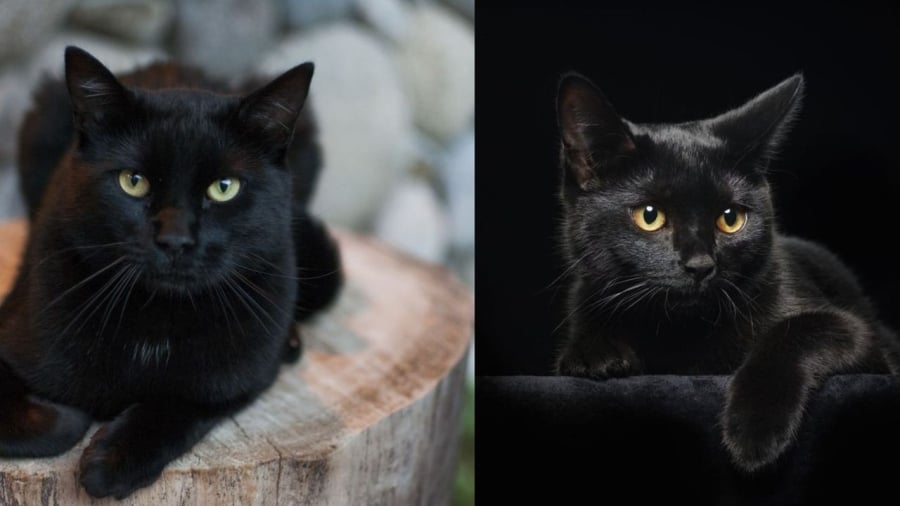In Vietnamese folk culture and many other Asian countries, the taboo of black cats at funerals is a tradition passed down from generation to generation. There are numerous eerie tales warning that if a black cat jumps over a corpse, the deceased may come back to life or be possessed by evil spirits.
Black Cats and Superstitions in Eastern Culture
Historically, black cats have been associated with negative connotations in Eastern cultures. They are believed to be omens of bad luck, demons, and death. In folklore, the image of a black cat screaming in the night is seen as a foreboding sign of impending doom, especially of death within a family.
During funerals, the Vietnamese used to be extremely cautious about letting cats, especially black ones, near the deceased’s body. This is due to their belief that if a black cat jumps over the corpse, the dead person might wake up and become a “ghost-possessed corpse.” This is a belief that the spirit of an evil ghost controls the body, making it seem alive when, in fact, it is occupied by a malevolent spirit.

Can the Dead Really Come Back to Life When a Black Cat Jumps Over Them?
To date, there is no scientific evidence to support the claim that a deceased person will come back to life if a black cat jumps over them. This is primarily a folk legend with a mystical nature, orally transmitted to educate, warn, or express the spiritual beliefs of the community.
However, some medical phenomena can partially explain why a person might seemingly come back to life or wake up after death.
Post-mortem spasm: After death, the body may exhibit slight movements due to chemical reactions in the muscles, which can be frightening to onlookers.
Catalepsy (death-like trance): Some individuals enter a deep coma, with heart rate and respiration decreasing to undetectable levels, leading to the assumption of death. However, they can be revived when exposed to external stimuli such as sound, heat, or movement.
The contrast between the positive polarity of cats and the negative polarity of a deceased human body can result in a powerful electric current that could potentially jolt the deceased back to life.
With panic, superstition, and a vivid imagination, stories of the dead coming back to life due to a cat’s presence may arise and spread.
Why Are Black Cats Particularly Taboo During Funerals?
There are several reasons why black cats, and cats in general, are avoided during funerals:
1. Spiritual and Yin Energy Associations: In Eastern beliefs, cats are considered creatures of yin energy and are highly sensitive to spirits and the afterlife. It is thought that cats can sense or be influenced by ghosts. Allowing cats near a corpse might cause spiritual disturbances.
2. Preventing Disturbance of the Body: The deceased is believed to be at rest, and any sudden movements, loud noises, bright lights, or physical contact, especially from a cat with its agile jumping abilities, could trigger post-mortem muscle spasms, leading to misunderstandings about resurrection.
3. Fear, Long-standing Oral Traditions: Black cats have an air of mystery, with shining eyes in the dark and eerie cries at night. These traits make them objects of spiritual fear. The repetition of oral traditions has solidified the taboo, despite a lack of concrete evidence.
Superstition About Black Cats in Funerals: A Custom to Understand and Respect
While the phenomenon of “the dead coming back to life due to a black cat” lacks scientific foundation, many, especially in rural areas or families adhering to traditional beliefs, still strictly observe the taboo against black cats during funerals.
This is not merely a spiritual matter but also a way to show respect for the deceased and avoid adding to the already heavy atmosphere of the funeral. Thus, during funerals, people often try to keep cats away from the coffin area, and some even sprinkle salt or burn incense to “ward off cats.”
“Should You Plant a Mango Tree in Your Front Yard?”
The mango tree has long been an integral part of Vietnamese culture and lifestyle, offering not just economic and culinary value but also holding deep symbolic significance in feng shui. Is it auspicious to plant a mango tree in front of your house? Let’s delve into this intriguing question and uncover the answers within.
The Tenacious Cactus: A Beauty with a Thorny Secret.
“Planting ornamental plants in front of your house is not just about aesthetics. It’s about creating a harmonious environment that aligns with the principles of feng shui and promotes safety. That’s why, according to ancient wisdom, cacti and other thorny plants are not recommended for the front yard. It’s all about striking a balance between beauty and positive energy flow.”



































